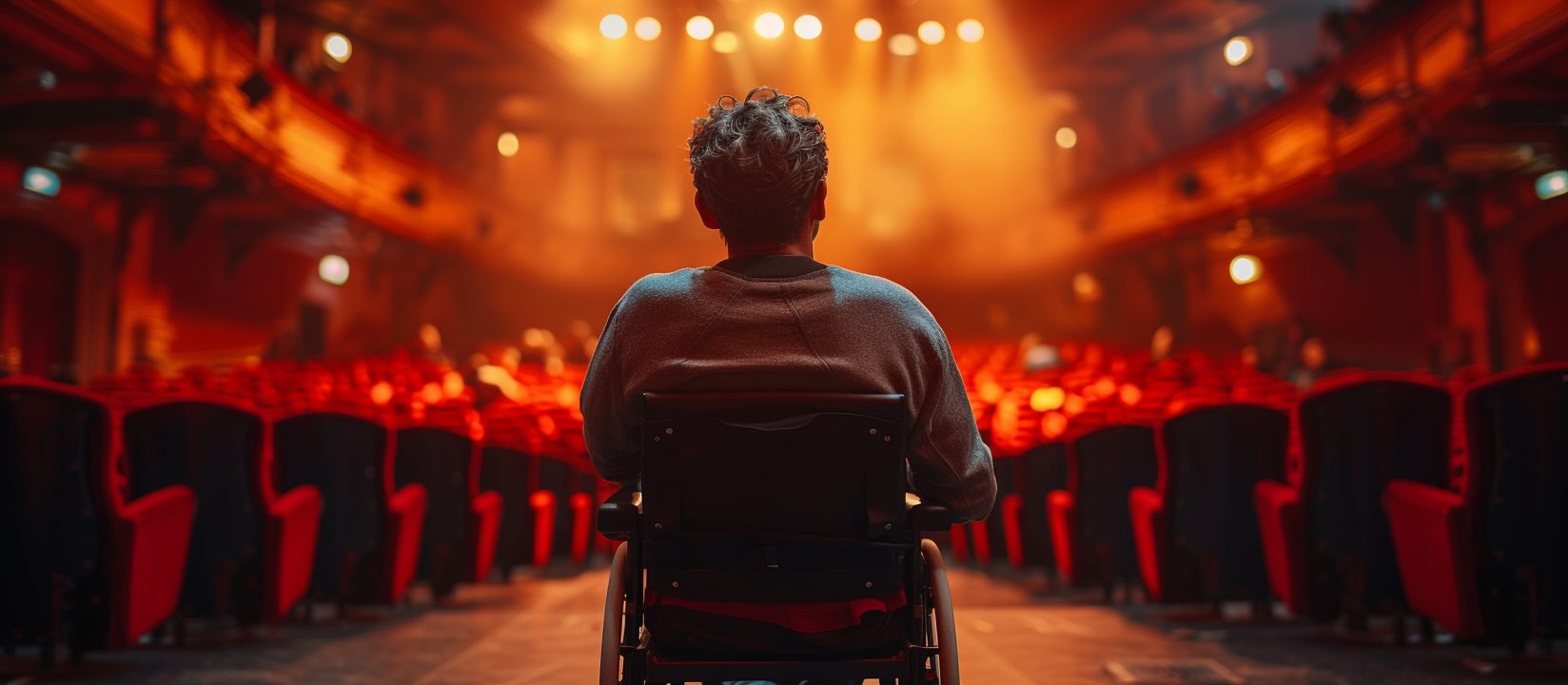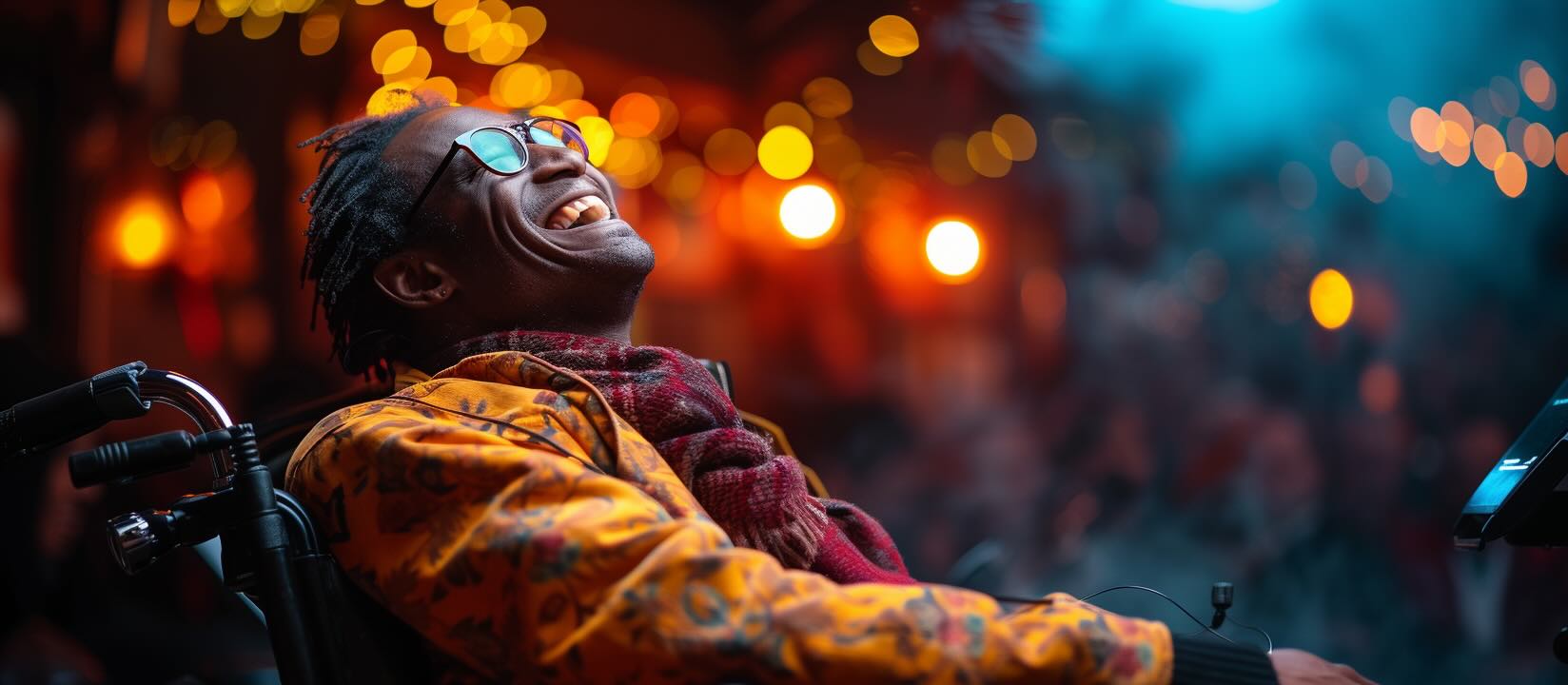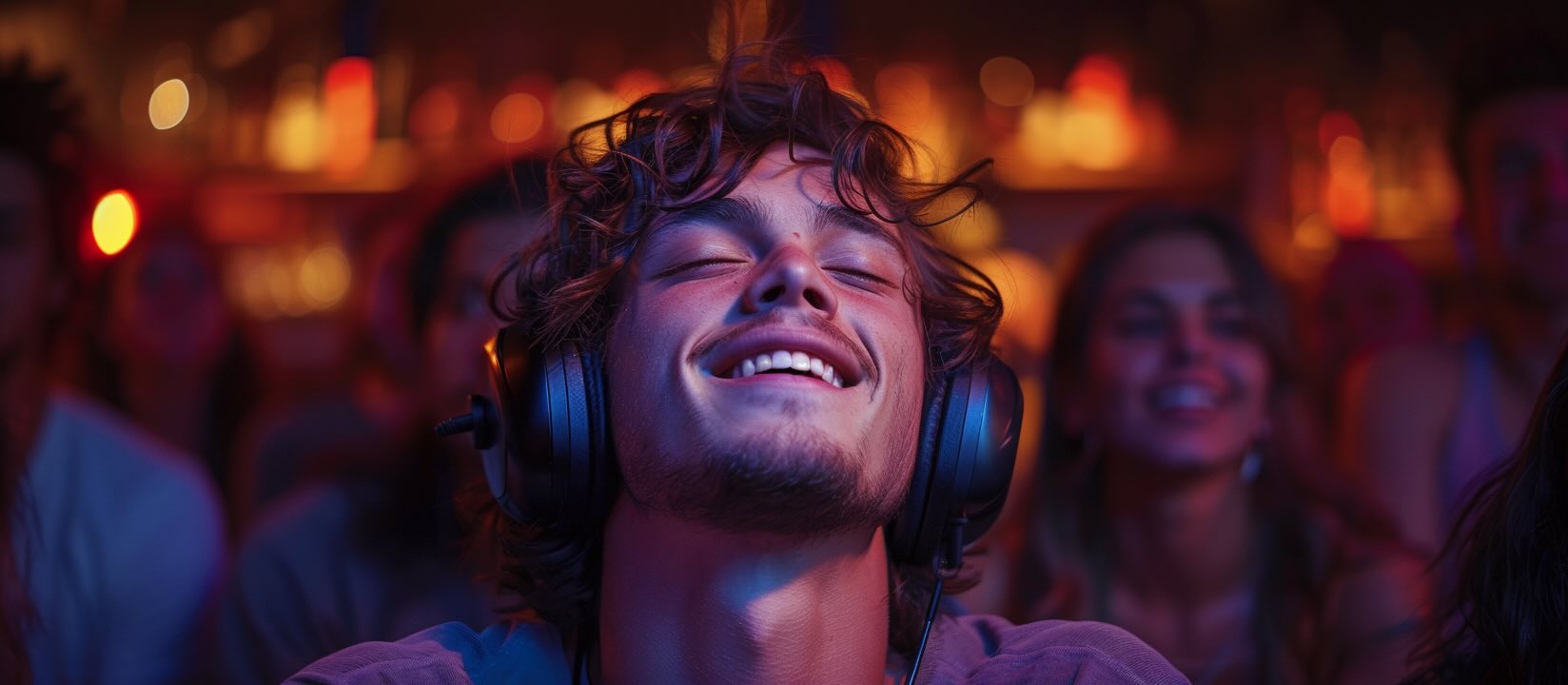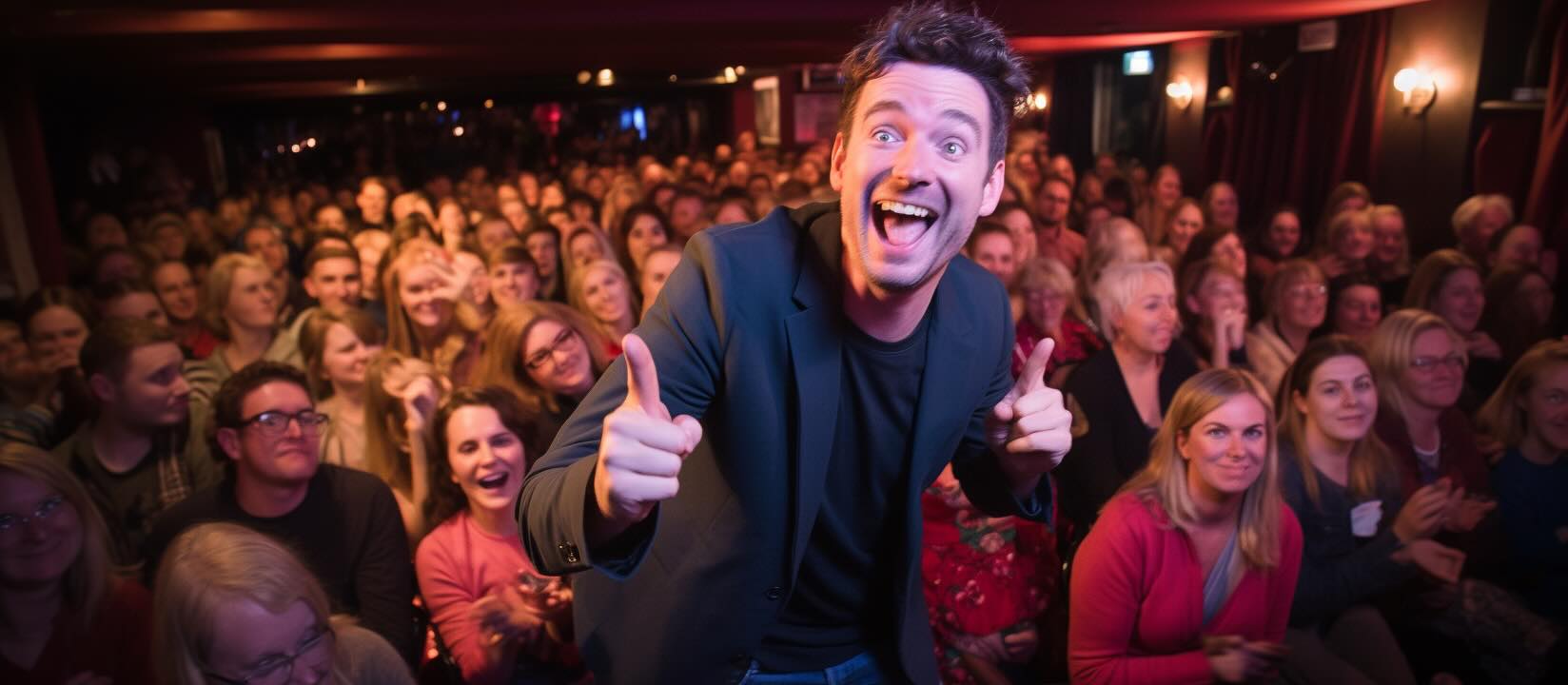
Finding comedy events that cater to various disabilities and needs can seem like a daunting task. But it’s crucial for ensuring everyone has access to a good laugh. We understand the importance of inclusion in entertainment and are here to guide you through the process.
With the right resources and a bit of know-how, locating comedy shows that provide necessary accommodations isn’t just possible; it’s easier than you might think. We’re here to share our expertise and make sure your next night out is both hilarious and accessible.
Understanding the Need for Accessibility in Comedy Events
Finding a way to laugh and enjoy a night out should be an experience accessible to everyone, regardless of any physical or sensory challenges they might face. Often, the importance of accessibility at comedy events is overlooked, limiting the inclusivity of these social and cultural gatherings. In this section, we’ll delve deeper into why accessibility in comedy events is crucial and the impact of overlooking these needs.
Why Comedy Events Should Be Accessible for Everyone
Comedy is a universal language that transcends various barriers, including physical disabilities, hearing or vision impairments, and neurodiversity. By ensuring comedy events are accessible, we’re not just opening doors for a more diverse audience, but we’re also enriching the experience for everyone involved. Here are some reasons why making comedy events accessible is imperative:
- Equal Opportunities for Enjoyment: Everyone deserves the chance to enjoy live entertainment without facing barriers. Comedy, at its core, should be an inclusive experience.
- Diverse Perspectives Lead to Richer Experiences: When comedy events are accessible, they attract a broader audience that includes people from different backgrounds and with different life experiences. This diversity can inspire comedians to explore a wider range of topics, making the comedy scene more vibrant and relatable.
- Legal Compliance: In many regions, there are laws and regulations, like the Americans with Disabilities Act (ADA), that require public events, including comedy shows, to be accessible. Ensuring events meet these legal standards is not only about compliance but also about showing commitment to equality and inclusivity.
The Impact of Inaccessible Comedy Events
When comedy events fail to account for accessibility, they inadvertently exclude a significant portion of the population from participating in a form of entertainment that could offer them joy and relaxation. The repercussions of such oversight are far-reaching:
- Social Isolation: People with disabilities might feel excluded from social experiences if events consistently fail to accommodate their needs.
- Missed Business Opportunities: Venues and organizers overlook a valuable segment of potential attendees, ultimately affecting comedy show ticket sales and profitability.
- Negative Brand Perception: Lack of accessibility can foster a negative image, suggesting a lack of concern for the diverse needs of the audience.
Making comedy events accessible isn’t just the right thing to do—it’s a step toward creating a more inclusive society where everyone can share a laugh. As we continue to advocate for these changes, we hope to see a significant shift in how comedy events cater to the diverse needs of their audience, ensuring that laughter truly is a universal language.
Identifying Comedy Events with Accommodations for Disabilities and Special Needs
When we’re on the hunt for comedy events that cater to those with disabilities and special needs, doing our homework pays off. Ensuring everyone has access to a hearty laugh involves knowing where to look and what to look for in comedy venues and their event listings.
Researching Comedy Venues and Event Listings
The first step in our quest for accessible comedy experiences involves digging into the nitty-gritty details of venues and their event listings. Many venues now highlight accessibility features on their websites, but here’s a rundown of what we typically do:
- Start with a visit to the venue’s official website. Look for a dedicated accessibility page or section in their FAQs.
- Use social media and forums to gather firsthand experiences from individuals who’ve attended past events. This can provide valuable insights into the venue’s actual accessibility arrangements.
- Explore event listings on platforms that specialize in accessibility information. Websites like Eventbrite and Accessibility.com often have filters to find events based on specific needs.
By understanding the features and services available, we’re better positioned to choose events that suit our needs or the needs of those we care about.
Reviewing Accommodation Information Provided by Comedy Event Organizers
Once we’ve identified potential comedy events, the next step is to closely review the accommodation information provided by organizers. Here’s how we tackle this:
- Direct Communication:
- Reach out to event organizers through email or a phone call to inquire about specific accommodations. It’s essential to discuss any particular needs directly to ensure they can be met.
- Detailed Event Description:
- Pay close attention to the event descriptions. Organizers who prioritize accessibility often detail the types of accommodations available, such as sign language interpretation, wheelchair access, or sensory-friendly environments.
- Feedback and Reviews:
- Look for feedback from attendees of previous events. Positive reviews often signify a genuine commitment to inclusivity and accessibility.
We’ve found that organizers who demonstrate a clear understanding and provision of necessary accommodations are not only more reliable but also contribute to a more inclusive and enjoyable comedy experience for everyone.
Through thorough research and communication, we can locate comedy events that do not just entertain but also embrace the full spectrum of our community’s diverse needs. By prioritizing accessibility, we all contribute to a more inclusive world where laughter truly is universal.
Types of Accommodations Available at Comedy Events
When attending comedy events, it’s crucial that everyone has access to laughter and enjoyment, regardless of their needs or disabilities. Here, we’ll dive into the variety of accommodations that can make comedy shows more accessible and enjoyable for all.
Physical Accessibility
Ensuring venues are physically accessible is fundamental. This includes:
- Wheelchair accessible seating areas with clear sightlines to the stage.
- Accessible parking close to the venue entrance.
- Barrier-free paths of travel within the venue, including entrances, restrooms, and service areas.
Physical accessibility not only complies with legal requirements but also signals an inviting space for everyone.
Auditory Accommodations
For individuals with hearing impairments, auditory accommodations are essential. These can consist of:
- Assistive listening devices that amplify the sound directly to earpieces or hearing aids.
- Sign language interpreters who can translate the performance in real-time.
- Closed captioning displayed on screens visible from all seating areas.
Such accommodations ensure that every joke and punchline is shared with the entire audience, no matter their hearing ability.
Visual Accommodations
Visual accommodations aim to assist attendees with limited or no vision. These could include:
- Audio descriptions where a narrator explains the visual elements of the performance in breaks in the dialogue.
- Braille or large print materials for any printed information or promotional materials.
- Guided assistance for navigating the venue safely and comfortably.
By addressing visual needs, venues ensure that humor transcends visual barriers.
Sensory Accommodations
Sensory-friendly accommodations are vital for individuals who might be overwhelmed by traditional settings due to sensory processing differences. Options include:
- Reduced sound levels to avoid sudden loud noises.
- Low lighting instead of strobe lights or flashing effects.
- Quiet zones where audience members can take a break if needed.
Creating a sensory-friendly environment allows those with sensory sensitivities to enjoy comedy in comfort and safety.
Communication Accommodations
Effective communication is key to inclusivity. Accommodations here focus on ensuring that all attendees can understand and engage with the content:
- Alternative formats for event information, such as audio recordings or easy-read versions.
- Q&A sessions using written questions or communication devices for those who communicate differently.
- Website and promotional materials that are accessible, providing clear information about the event and its accommodations.
By prioritizing diverse communication needs, event organizers foster an atmosphere of inclusivity, ensuring that comedy truly is for everyone.
How to Find Accessible Comedy Events Near You
Finding comedy events that cater to a diverse range of needs doesn’t have to be a daunting task. With the right tools and communities at our fingertips, we can easily locate events that offer the accommodations necessary for everyone to enjoy a night full of laughter. Below, we’ve detailed effective methods to help us all find accessible comedy events near us.
Utilizing Online Resources and Apps
The digital age has made it much easier for us to identify venues and events that prioritize accessibility. Here are some key strategies:
- Event Listing Websites: Websites like Eventbrite and Meetup often include filters that allow us to search for events based on their accessibility features. It’s important to look for listings that explicitly mention accommodations such as wheelchair access, sign language interpretation, or assistive listening devices.
- Venue Websites: Many comedy clubs and venues now highlight their accessibility features on their websites. Look for a section often titled “Accessibility” or “ADA Accessibility” for detailed information.
- Mobile Apps: Several apps are dedicated to mapping out accessible spots, including entertainment venues. Apps like Wheelmap and AccessNow rate locations based on their level of accessibility, providing us with insights from other users’ experiences.
Leveraging these online resources and apps not only simplifies the process of finding accessible comedy events but also empowers us to make informed decisions based on our specific needs.
Joining Online Communities and Forums
Another effective way to discover accessible comedy shows is by tapping into the knowledge and experiences of others within online communities and forums. Here’s how:
- Social Media Groups: Platforms like Facebook and Reddit host various groups dedicated to disability rights and accessible entertainment. Joining these groups allows us to ask for recommendations, share experiences, and receive updates on upcoming accessible events.
- Disability Organizations and Blogs: Many organizations and bloggers focusing on disabilities regularly post about accessible events and venues. Following them can provide us with a steady stream of curated information, including reviews of comedy events.
- Event Feedback Threads: In some forums and groups, members create threads to discuss specific events, including their accessibility features. Participating in or reading these threads can offer insights not available through official channels.
By engaging with online communities and forums, we enrich our search for accessible comedy events with personal recommendations and shared experiences, making it easier to find events that suit our needs. This community-driven approach not only helps us identify suitable events but also fosters a sense of solidarity and support among those seeking accessible entertainment options.
The Importance of Promoting Accessible Comedy Events
Encouraging Comedy Venues and Organizers to Prioritize Accessibility
In our mission to locate comedy events with accommodations for various disabilities and needs, it’s paramount we also focus on the root of the accessibility chain: the venues and organizers themselves. By encouraging these stakeholders to prioritize inclusivity, we’re not just advocating for changes but are actively participating in shaping a more accessible entertainment culture.
Simple actions such as reaching out to comedy venues with detailed suggestions on how to improve accessibility can make a significant impact. We’ve found that presenting clear, actionable advice is often welcomed, as many organizers aim to provide enjoyable experiences for all guests but might lack specific knowledge in this area. Whether it’s recommending the installation of assistive listening devices, suggesting the hiring of sign language interpreters for shows, or highlighting the importance of wheelchair-accessible seating arrangements, our collective voice can steer the industry toward a more inclusive future.
Additionally, by supporting venues and events that regularly incorporate accessibility features, we’re voting with our patronage, showing that there is a significant demand for inclusive comedy experiences. This not only benefits individuals with disabilities but also broadens the audience base for performers and venues, creating a win-win situation for the comedy ecosystem.
Spreading the Word and Increasing Awareness
Beyond directly engaging with venues and event organizers, spreading the word about the importance of accessibility in comedy events plays a crucial role in our endeavors. Through the use of social media, blogs, and online forums, we have the power to elevate conversations around inclusivity in entertainment, reaching a vast audience that includes potential allies, individuals with disabilities, and even those not yet aware of the need for such accommodations.
Creating informative content that highlights the benefits of accessible comedy events, sharing personal stories and testimonials from those who have experienced both accessible and non-accessible events, and promoting a list of upcoming inclusive comedy shows are just a few ways we can increase awareness and encourage more frequent accommodation provisions.
By publicly acknowledging and appreciating venues and organizers that prioritize inclusivity, we not only provide them with positive reinforcement but also set a benchmark for others in the industry. It’s about creating a ripple effect that encourages a shift in how comedy entertainment is approached, making it clear that accessibility should be a standard, not an optional extra.
Through these efforts, we aim to build a stronger, more inclusive comedy culture where laughter truly is accessible to everyone.
Key Takeaways
- Accessibility is Essential for Inclusive Comedy: Ensuring comedy events are accessible is crucial, not only for compliance with legal standards like the ADA but for fostering a more inclusive entertainment culture that welcomes diverse audiences.
- Types of Accommodations Make a Difference: Venues that offer a range of accommodations, including wheelchair accessibility, auditory and visual aids, and sensory-friendly adaptations, provide better experiences for people with various disabilities and needs.
- Engagement and Advocacy Promote Change: Actively communicating with venues and event organizers about the need for and benefits of accessibility—and acknowledging those that exemplify inclusivity—can drive positive change in the comedy event industry.
- Utilizing Resources to Find Accessible Events: Leveraging online platforms, mobile apps, and community forums helps to discover comedy events that prioritize accessibility, showcasing the importance of technology and networks in facilitating inclusive entertainment experiences.
- Community-driven Initiatives Enhance Awareness: Participation in and support of inclusive comedy events, coupled with spreading awareness through social media and online communities, amplify the message that laughter should be accessible to all, contributing to a shift towards more welcoming entertainment environments.
Conclusion
In our journey to create more inclusive environments at comedy events, it’s vital that we not only seek out these accessible venues but also take active steps to promote and encourage the proliferation of such accommodations. We’ve seen firsthand the power of accessibility in transforming comedy events into welcoming spaces for everyone, regardless of their physical or sensory needs.
One key strategy is to engage with event organizers directly. We’re often surprised at how open many venues are to suggestions for improving accessibility. By providing constructive feedback and sharing resources on accessible practices, we can foster a culture of inclusivity within the comedy scene. Moreover, supporting comedy events that already prioritize accessibility by attending their shows and promoting them on our social media channels sends a powerful message about the value of inclusion.
Another impactful approach is utilizing social media and online forums to spread awareness about accessible events. Sharing our positive experiences with accommodations at comedy shows not only highlights what’s possible but also encourages others to demand similar standards. Through blog posts, tweets, or even video reviews, we can draw attention to the accessibility features that make a difference, helping others to identify and support venues that get it right.
We also recommend subscribing to newsletters and following social media pages of organizations dedicated to disability rights and accessibility advocacy. These groups often have up-to-date information on accessible events and can be a great resource for discovering inclusive comedy shows.
By taking these steps to promote accessibility in comedy, we’re not just ensuring that more people can enjoy laughter without barriers, but we’re also helping to establish a new standard for entertainment venues everywhere. Engaging with venues, sharing our experiences, and utilizing our networks to raise awareness are all ways we can contribute to a more inclusive comedy scene.
Frequently Asked Questions
What is the main focus of the article?
The article emphasizes the importance of promoting accessibility at comedy events to ensure they are inclusive to everyone, including individuals with disabilities.
How can individuals contribute to making comedy events more accessible?
Individuals can contribute by engaging with event organizers to provide feedback on accessibility, supporting accessible events, spreading awareness via social media, and subscribing to newsletters from organizations focused on disability rights and accessibility advocacy.
Why is it important to support accessible comedy events?
Supporting accessible comedy events helps establish a standard for inclusivity in entertainment venues, ensuring everyone can enjoy comedy, regardless of their physical abilities or needs.
What role does social media play in promoting accessible comedy events?
Social media serves as a powerful tool to spread awareness about accessible comedy events, enabling individuals to share information, experiences, and recommendations with a wider audience.
How can feedback be used to improve accessibility at comedy events?
Feedback can inform event organizers about potential accessibility issues and practical solutions, encouraging them to adopt inclusive practices and make comedy events enjoyable for all attendees.



Leave a Reply